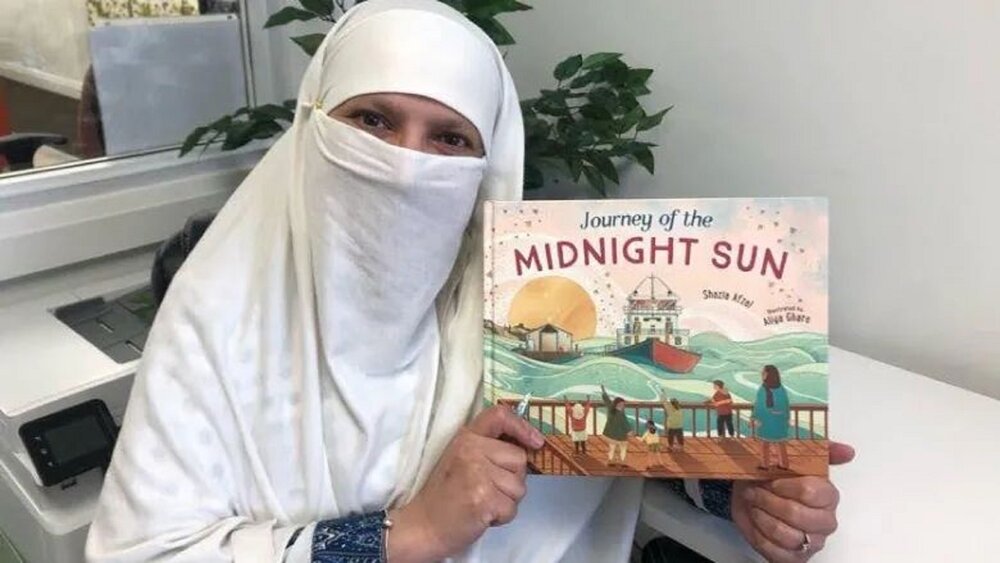Hawzah News Agency – It was an incredible three-week, more than 4,000-kilometre journey by land and water that brought a mosque to Inuvik from Winnipeg in 2010.
Now, a new picture book tells the story of that trip — a book the author hopes will help keep this remarkable story alive.
"It's a message of the community being together," said Shazia Afzal, the author of Journey of the Midnight Sun.
The story of the mosque's trip from Winnipeg to Inuvik, N.W.T., shows people how they can unite and work together, no matter their faith or background, she said.
When the northern town needed a new mosque in 2010, it was determined the most cost-effective way to get one was actually to build it in Winnipeg and then move it.
So after it was constructed, it was loaded onto a flatbed semi-trailer and driven to Hay River, N.W.T., where it was loaded onto a barge and floated down the Mackenzie River to Inuvik.
The mosque — now called the Midnight Sun Mosque, and affectionately known as "the little mosque on the tundra" — arrived in Inuvik on Sept. 23, 2010, after leaving Winnipeg on Sept. 1.
Afzal, a Mississauga, Ont., teacher and storyteller, said the idea for writing a book about the move came after she noticed a lack of books about mosques for younger readers.
"I was working at an Islamic-based faith school in 2010, and I was shocked to not see a single picture book about mosques," she said.
She asked her co-workers at the school if they knew of any such books, but when they visited libraries, "there was not a single one," she said.
That's when one of the teachers Afzal worked with showed her an article about the Midnight Sun Mosque.
"I started gathering every article about the mosque's journey and told myself that this story needs to be shared with children everywhere," Afzal said.
'It's a children's book that came to life'
At the time, though, she had no idea how to write a children's book.
"I took [writing] courses over the years and it finally happened. Then I pitched it to publishers and here we are," she said.
She also turned to Arctic Mosque, a 2013 documentary by filmmakers and sisters Nilufer and Saira Rahman, for research that helped her write the book.
"The documentary shows you all sorts of people helping through the journey, and it melted my heart," Afzal said.
What stuck with her when she was watching the documentary was how during Eid prayer, a church there let the Muslim community use their space to pray as they needed a bigger space.
"That's beautiful," Afazal said. "That's respecting. That's sharing space."
Nilufer Rahman, the co-director of Arctic Mosque, says creating a positive consciousness around faith communities for kids makes a huge difference.
It also just makes sense to tell the story of the mosque in a children's book, she says.
"It's a children's book that came to life, rather than the other way around."
Making Muslim history
Hussain Guisti, who was one of the driving forces behind getting the mosque to Inuvik, says he never imagined that people would still be talking about it today.
"This story still brings me to tears," he said, wiping his eyes.
Guisti is the general manager and chief financial officer of Zubaidah Tallab Foundation, a Manitoba-based Islamic charity that was instrumental in funding the move.
He says at the time, he wanted to help the Muslim community in Inuvik, who were in need of a mosque to pray in.
"One of the community members in Inuvik was an old friend of one of our members. He reached out to him and that's how we found out," Guisti said.
They initially looked at helping to build a mosque in Inuvik.
"We sent out a tender to 11 [construction] companies in Inuvik and the average price we got back was $550,000," he said.
After looking at every option, Guisti realized that it would cost about $300,000 to build it in Winnipeg and transport it.
That included getting it onto the barge at Hay River, which operated three times a year only, so there was no room for delays, Guisti said.
In spite of briefly getting stuck in Edmonton and nearly teetering off a bridge just north of the Alberta-Northwest Territories, the mosque made it on time for the last barge of the year.
It finally made its way to Inuvik, where it's still in use today as one of the world's northernmost mosques.
"I saw the opportunity to make Muslim history," said Guisti.
Young readers will now be able to learn that history in Afzal's book, which was just published last month and is now in many public libraries and schools.
With Islamophobia still a threat, Afzal hopes the story of the mosque will help children learn about acceptance.
Whenever a school district calls to ask her to do readings for kids, Afzal says she feels accepted and acknowledged.
"We all are different, but we all are same and we can help each other," she said.


Your Comment